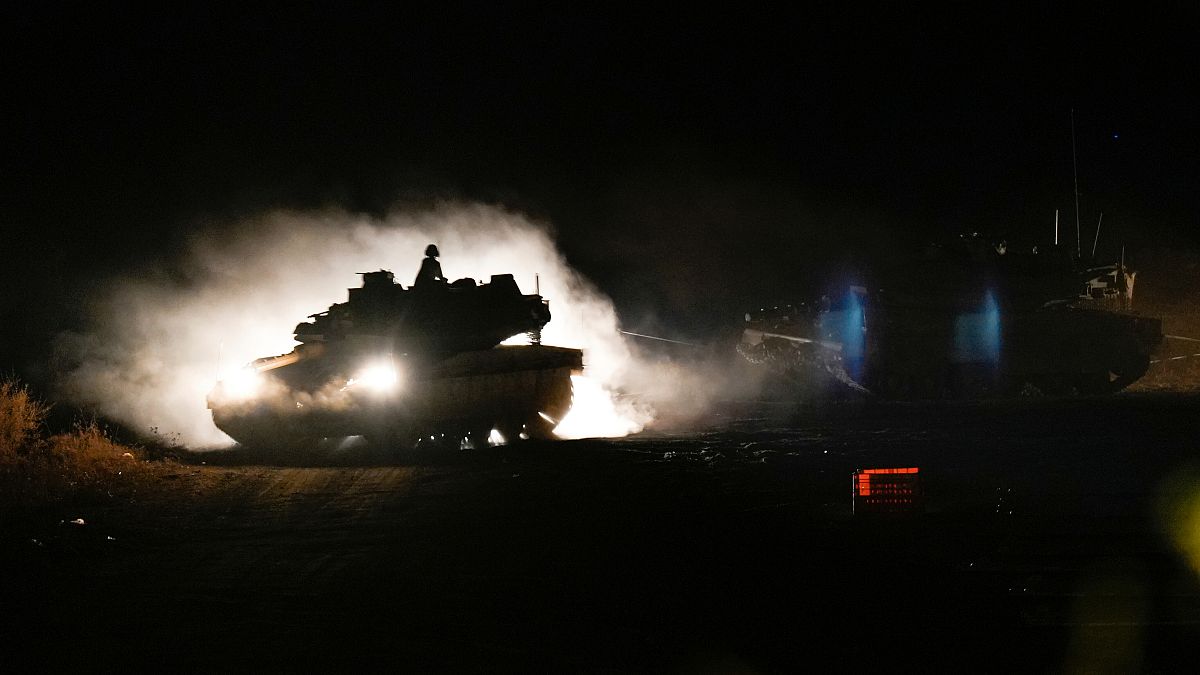The killing of the leader of Hezbollah has been followed by the start of an Israeli boots-on-the-ground operation.
Iran is preparing to “imminently” launch a ballistic missile attack on Israel, according to a senior US official, who warned Tuesday of “severe consequences” should it take place.
The official, who spoke on the condition of anonymity to discuss the intelligence, said the US is actively supporting Israeli defensive preparations. This comes after the Israeli military on Tuesday warned people to evacuate nearly two dozen Lebanese border communities hours after announcing what it said were limited ground operations against Hezbollah.
White House officials did not immediately offer any evidence backing its intelligence finding. The official added that the administration was confident in the determination.
Iran’s state media has not suggested any attack is imminent. Iranian officials could not be immediately reached for comment.
Hezbollah and Hamas are both backed by Iran, and each escalation over the past year has raised fears of a wider war in the Middle East that could draw in Iran and the United States, which has rushed military assets to the region in support of Israel.
Iran already launched an unprecedented direct attack on Israel in April, but few of the Iranian projectiles reached their targets. Many were shot down by a US-led coalition, while others apparently failed at launch or crashed while in flight.
Israeli Prime Minister Benjamin Netanyahu said on Tuesday that Israel is facing “large challenges” as it fights an Iranian “axis”. In a videotaped statement, he urged the public to listen to public safety guidelines from the army’s Home Front Command, but made no direct mention of a missile threat.
The Israeli army has announced it has carried out dozens of ground raids into southern Lebanon over the last year. Israel released video footage purporting to show its soldiers operating in homes and tunnels where Hezbollah kept weapons.
If the claims and footage are proven true, it would be another humiliation for Hezbollah, the most powerful non-state armed group in the Middle East.
Hezbollah has been reeling from weeks of targeted strikes that killed its leader, Hassan Nasrallah, and several of his top commanders.
US ships and aircraft are already positioned in the region to assist Israel in the event of an attack from Iran. There are three US Navy destroyers in the Mediterranean Sea, an aircraft carrier in the Gulf of Oman and fighter jets arrayed throughout the region. All have the ability to shoot down incoming missiles.
Over the line
Neither the Lebanese army nor a UN peacekeeping force that patrols southern Lebanon have yet confirmed that Israeli forces have entered the area. The UN force said a cross-border operation would be a violation of Lebanese sovereignty.
Hezbollah spokesman Mohammed Afif dismissed what he said were “false claims” of an Israeli incursion, and said Hezbollah is ready for “direct confrontation with enemy forces that dare to or try to enter Lebanon”.
But the Israeli military’s top spokesperson, Rear Admiral Daniel Hagari, claimed his troops were conducting “localised ground raids” on Hezbollah positions in southern Lebanon to ensure Israeli citizens could return to their homes in the north.
“We’re not going to Beirut,” he said. “We’re only going to areas next to our border and will do what is necessary to dismantle and demolish Hezbollah infrastructure.”
He said Israel had carried out dozens of small raids inside Lebanon going back to Oct. 8, when Hezbollah began firing rockets into Israel after the outbreak of the war in Gaza.
He said Israeli forces had crossed the border to collect information and destroy Hezbollah infrastructure, including tunnels and weapons. Israel has said Hezbollah was preparing its own 7 October-style attack on Israeli territory, but those claims have yet to be independently verified.
Escalation
Israeli artillery units pounded targets in southern Lebanon overnight and the sounds of airstrikes were heard throughout Beirut.
The Israeli military official said Hezbollah had launched rockets at central Israel, setting off air raid sirens and wounding a man in his 50s. Hezbollah said it fired salvos of a new kind of medium-range missile at the headquarters of two Israeli intelligence agencies near Tel Aviv.
Afif, the Hezbollah spokesman, said the missile attack “is only the beginning.”
The Israeli military official said Hezbollah had also launched projectiles at Israeli communities near the border, targeting soldiers without wounding anyone.
Hezbollah began firing rockets into northern Israel shortly after Hamas’ 7 October attack ignited the war in Gaza. Israel has launched retaliatory airstrikes and the conflict has steadily escalated. In recent weeks Israel has unleashed a punishing wave of airstrikes across large parts of Lebanon.
The mounting toll
Israeli strikes have killed more than 1,000 people in Lebanon over the past two weeks, nearly a quarter of them women and children, according to the Health Ministry. Hundreds of thousands of people have fled their homes.
Hezbollah is a well-trained militia, believed to have tens of thousands of fighters and an arsenal of 150,000 rockets and missiles. The last round of fighting in 2006 ended in a stalemate, and both sides have spent the past two decades preparing for their next showdown.
Recent airstrikes wiping out most of Hezbollah’s top leadership and the explosions of hundreds of pagers and walkie-talkies belonging to Hezbollah indicate Israel has infiltrated deep inside the group’s upper echelons.
Hezbollah vowed Monday to keep fighting even after its recent losses. The group’s acting leader, Naim Kassem, said in a televised statement Monday that Hezbollah commanders killed in recent weeks have already been replaced.
European countries have begun pulling their diplomats and citizens out of Lebanon. A British government-chartered flight was due to leave Beirut on Wednesday to evacuate UK nationals.
The UK has also sent 700 troops to a base in the nearby island nation of Cyprus to prepare for a potential evacuation of the estimated 5,000 British citizens in Lebanon.

